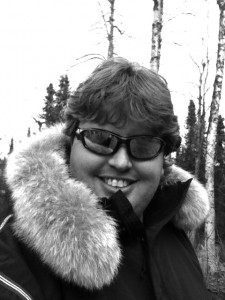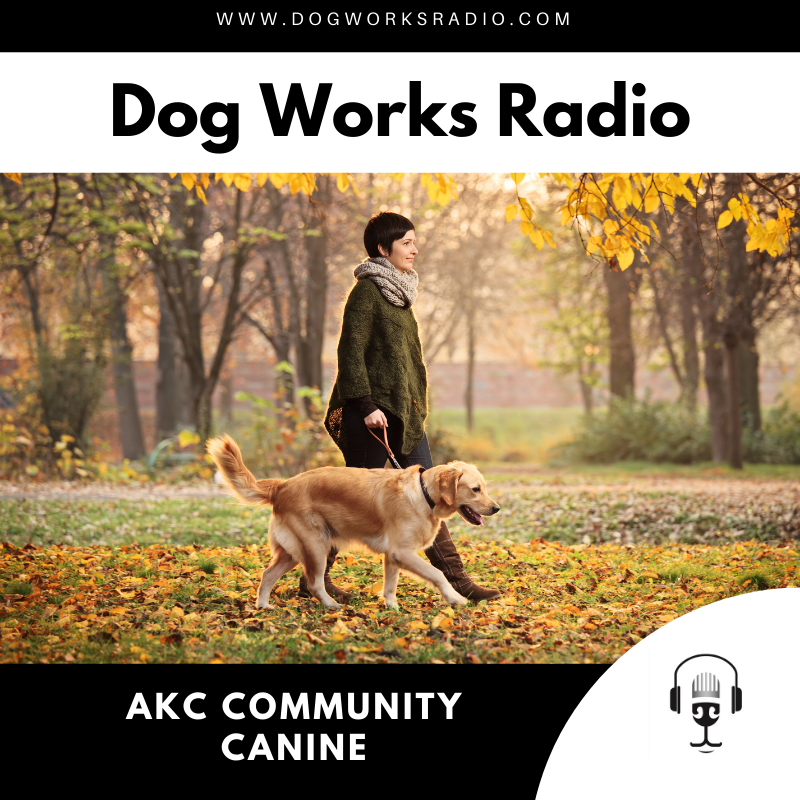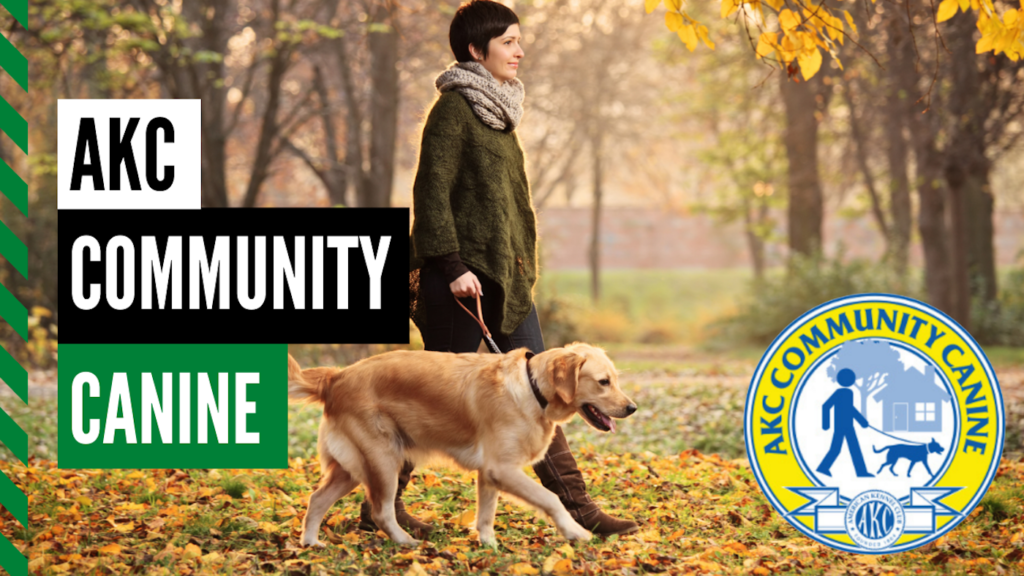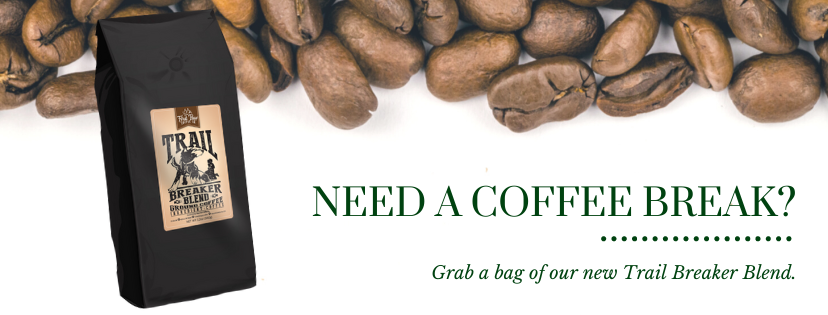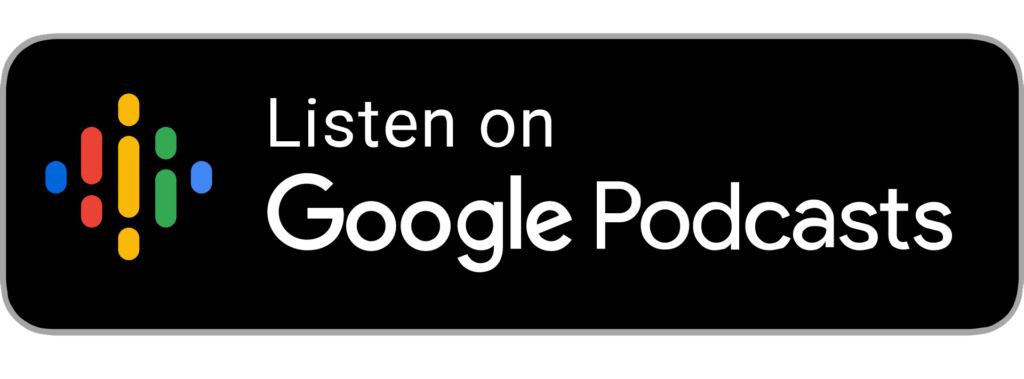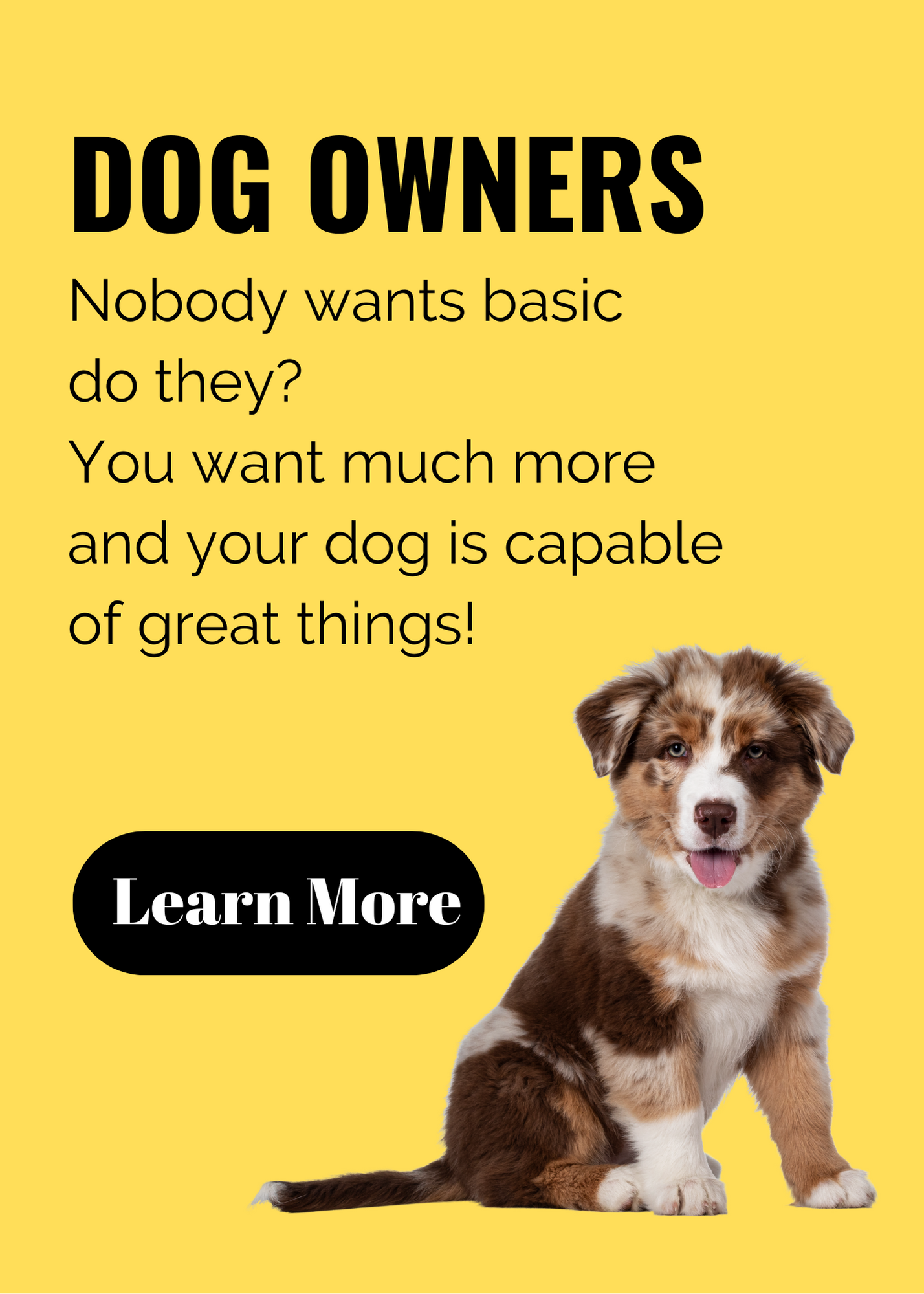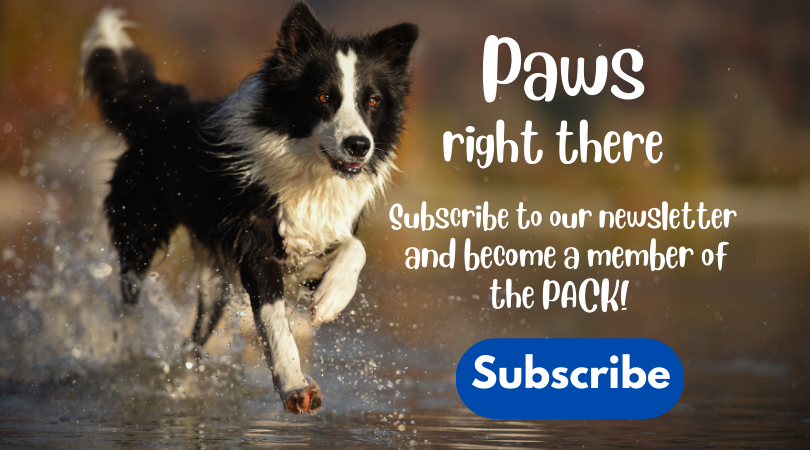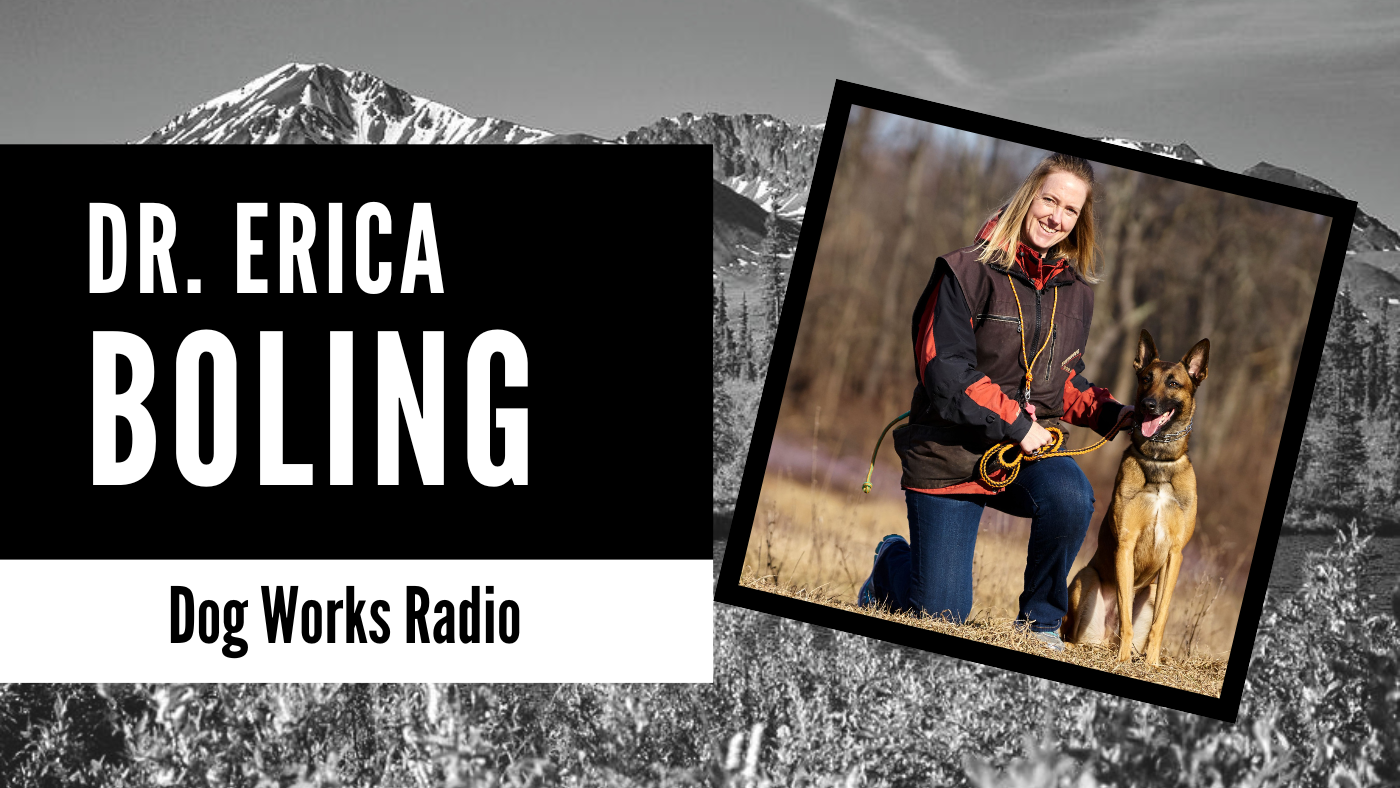Join host Michele Forto as she discusses the American Kennel Club’s Community Canine (AKC CGCA) program on Dog Works Radio.
If you are a dog owner, you are probably familiar with the Canine Good Citizen program offer through the American Kennel Club. This program has been around for years and is a great way to get you and your dog involved in training on the next level if you have taken a group puppy class with a private trainer or at one of the big box stores. But did you know that there is another level of the CGC program? It is called the AKC Community Canine and is a great place to start if you think your dog has what it takes to be either a service or therapy dog, or if you take your pup out to the local coffee shop of corner café.
What we talk about on this episode:
- Items on the test
- Can you use treats during the test?
- How much does it cost?
What is it?
AKC Community Canine is the third and most advanced level of the Canine Good Citizen Program. In AKC Community Canine, dogs can earn the CGCA (Advanced CGC) title.
The goal of AKC Community Canine is to test the dog’s skills in a natural setting. For example, rather than the dog being tested in a ring, in AKC Community Canine, the “walks through a crowd” test item will involve the dog walking through a real crowd at a dog show, on a busy sidewalk, at a training club, or in a local park.
About the AKC Community Canine Title
AKC Community Canine is the advanced level of the AKC’s Canine Good Citizen Program. Dogs who pass the AKC Community Canine test earn the official AKC Community Canine title that is designated by the letters “CGCA” (Advanced CGC) on the dog’s title record.
Whereas Canine Good Citizen tests are most often tested in a ring and situations are simulated (e.g., 3 helpers serve as a “crowd”), the AKC Community Canine test is done in real situations including at shows, classes, and in the community.
AKC Approved CGC Evaluators administer the AKC Community Canine test.
The AKC Community Canine testing level is all about responsible dog ownership and having a well-behaved dog in the community. Your role as a responsible dog owner begins the moment you decide to add a new dog or puppy to your family.
How It Works
You can attend a basic training class to teach your dog the CGCA behaviors, or if you have the skills and knowledge, you can teach your dog the CGCA skills yourself.
When your dog is ready, sign up for a CGCA test administered by an AKC Approved CGC Evaluator. Tests are held in the community, at AKC dog shows, at training classes, and at some pet supply stores.
When your dog passes the CGCA test, the evaluator will give you the paperwork to send to AKC to request the CGCA title certificate.
AKC’s Canine Good Citizen Program FROM PUPPIES TO THE COMMUNITY
With the introduction of AKC Community Canine, the Canine Good Citizen Program now provides a comprehensive 3 level training program for you and your dog.
AKC S.T.A.R. Puppy:
First Step in Training
You and your puppy attend a class at least 6 weeks long to earn the STAR
certificate and gold medal. S.T.A.R. stands for Socialization, Training, Activity, and Responsible dog ownership.
Canine Good Citizen:
Is for Responsible Owners that want Well-Mannered Dogs.
AKC’s Canine Good Citizen program is recognized as the gold standard for dog behavior. In CGC, dogs who pass the 10 step CGC test can earn a certificate and/or the official AKC CGC title.
AKC Community Canine:
Can be described as Advanced CGC. AKC Community Canine extends the skills learned in CGC to the community, Dogs who pass the AKC Community Canine test are eligible for the “CGCA” (Advanced CGC) title.
Age Requirements for Dogs
There is no age limit for dogs taking the AKC Community Canine test. However, before taking the test, dogs must have a Canine Good Citizen test on record at AKC.
There are several exceptions to having no age limit at an AKC Community Canine test. When AKC Community Canine tests are given in conjunction with AKC events, clubs enforce the regulations for all activities.
Collar, Leashes and Equipment
All tests must be performed on leash. Dogs should wear well-fitting buckle or slip collars (including martingales) or body harnesses. Body harnesses should not restrict the movement of the dog. Special training equipment such as pinch collars and head collars are not permitted. The leash should be made of either leather or fabric. Retractable leashes may not be used in the test.
We recognize that special training collars may be valuable equipment in the beginning stages of dog training, however, we feel that dogs are ready to be tested after they have been transitioned to a slip or buckle collar (body harnesses are also acceptable). If an evaluator is teaching classes and does not feel comfortable with one of the permitted collars, students may be required to take the test in the type of collar used in class (as long as it is permitted by AKC for testing). If the test is advertised for the general public, all of the permitted collar types and body harnesses should be allowed in the test.
Fees
Test-giving organizations and individual evaluators may charge a fee for conducting an AKC Community Canine test. Fees are used to cover the costs of test kits, mailing, copying, and advertising related to the test. Private trainers sometimes charge a fee for a testing session that is commensurate with their hourly rate of service. There is a $20.00 processing fee that the dog owner will pay to the AKC for the AKC Community Canine title.
Food
Handlers are not permitted to use food as a reward during the AKC Community Canine Test. While we recognize that food can be an effective reinforcer during training, it should not be used in the test. As with CGC, the purpose of the AKC Community Canine test is to determine if the dog relates to the owner and if it can be controlled without food.
Handler/Dog Interactions During Test
Handlers may talk to their dogs and provide praise throughout the test. The test items should be in as natural, realistic format as possible. Evaluators should encourage the test to be fun.
Evaluators may remind handlers to communicate with their dogs. Evaluators should not make the test easier by eliminating test items, nor should they require a higher level of performance than the test requires. Of course, evaluators may choose to teach more advanced skills in their classes.
AKC COMMUNITY CANINE TEST
Advanced Canine Good Citizen (the “CGCA” title)
To earn the CGCA title, the dog must:
- be registered or listed with AKC (AKC number, PAL, or AKC Canine Partners number) and,
- already have a Canine Good Citizen award/title on record.
Dogs must pass all 10 items of the test to receive the CGCA title.
- Dog stands, sits or lies down and waits under control while the owner:
- sits at the registration table and fills out paperwork, or,
- if the test is done in the community, dog waits while the owner sits and has a snack or visits with another person (e.g., at a park)
- Walks on a loose leash in a natural situation (not in a ring) — does not pull.
- left turn
- right turn
- stop
- fast and slow pace
- Walks on loose leash through a crowd:
- at a show or in class, this item is tested in a real crowd, not in a ring
- in the community, dog walks on sidewalk, through a crowd at a community fair, park, on a trail, through a busy hallway, etc.
- Dog walks past distraction dogs present; does not pull.
This item may be tested along with #3 if there are dogs in the crowd, etc.- at a show or class, dog walks by dogs waiting in the crowd–dogs 2 ft. apart
- in the community, dog walks by other dogs on a trail, sidewalk, in a hallway, etc.
- Sit — stay in small group (3 other people with dogs).
Owners and dogs are in an informal circle/square while owners have a conversation.
Dogs are all on the owner’s left side, on leash; 3 ft. apart. (At least 30 seconds) - Dog allows person who is carrying something (backpack, computer bag, etc.) to approach and pet it.
“May I pet your dog?” (Item is placed on floor/ground before the person pets the dog) - “Leave it.” Dog walks by food and follows owner instructions, “Leave it.”
This can be food placed by the evaluator on the floor or ground in a food dish with a wire cover as in Rally. - Down or sit stay — distance (owner’s choice).
Dog is on 20–ft line, owner walks away with back to dog, picks up an item (e.g., backpack, training bag, clipboard, folder etc.) placed on the floor/chair/ground by the evaluator and returns to the dog. - Recall with distractions present (coming when called). Handler goes out 20–ft. **(off center) and calls dog.
Dog is on the 20–ft. line from #8 above. - Dog will sit or stand stay (owner’s choice) while owner enters/exits a doorway or narrow passageway. Owner calls dog through door when ready.
Owner may also choose to:- send the dog through first and have the dog wait for the owner, or
- the owner may choose to have the dog go through the doorway at the owner’s side.
Whichever method is used, the dog must not pull the owner and must be under good control. Think of the handler having the leash in one hand and a cup of coffee in the other.
Doorway or gate can be real or simulated with ring gates, two chairs, or a natural passageway (e.g., entrance to trail) in the community.
I hope you enjoyed today’s episode and if you think you might want to take your dog through the Community Canine course go check us out at Alaskadog works.com or if you are not near us just search akc.org and you can find a trainer near you. Oh, one last thing, if you like our show did you know the single best thing you can do is tell your family and friends about us and encourage them to listen in.
I am Michele Forto, see you next time.
Host, Michele Forto’s Bio: Michele Forto is the lead trainer for Alaska Dog Works where they train dogs for service work, obedience, and more. Michele is also the business manager and husky wrangler for Team Ineka. When Michele is not training dogs she loves to travel on their annual Rock n Roller Tours where she and Robert hit up rock concerts and roller coasters around the country.
Host, Robert Forto’s Bio: Robert Forto is the training director for Alaska Dog Works where they train dogs for canine obedience, working dogs, therapy dogs, and service dogs for clients all over North America. He is also a dog musher and he and his wife operate a 36-dog mushing kennel in Willow, Alaska, called Team Ineka. They can often be seen at local races and leading expeditions in the Alaska backcountry with outdoor leadership students at the University of Alaska. Robert is the producer of Dog Works Radio that has been on the air since 2009 and is currently simulcast on a local radio station, KVRF in Palmer, Alaska.
Links and Resources Mentioned:
- RSS feed for our show: https://dogworksradio.libsyn.com/rss
- Alaska Dog Works
- First Paw Coffee
- Robert Forto on Twitter: @robertforto
- Dog Works Radio on Twitter: @dogworksradio
- Michele Forto on Twitter: @micheleforto
- Alex Stein on Twitter: @coldfootfilms
- Dog Works Radio on Facebook
- Dog Works Radio on Instagram
- KVRF in Alaska
Thanks for Listening! We appreciate your visiting our site today and for help in bringing awareness to the Dog Works Radio podcast
Where we are going? (In real life)
- Rock n Roller Coaster Tour 21 #rocknroller21 to live host The Coaster Geeks Podcast
- Podcast Movement 21 in Nashville in August #PM21
- Podcast Movement 22 in Dallas #PM22
Audience feedback drives the show. We would love for you to email us and keep the conversation going! Email live@dogworksradio.com or call us at 907-841-1686
-
- We would love to hear from you!
Help us spread the word! We would love it if you could please share #DogPod with your Twitter followers. Click here to post a tweet If you dig this episode head over to Apple Podcasts and kindly leave us a rating or a review and subscribe!
Ways to subscribe to Dog Works Radio
Feedback and Promotion You can ask your questions, make comments, and request a show topic! Let your voice be heard.
-
- Email live@dogworksradio.com
- Book an interview on the show
- Take the Survey
